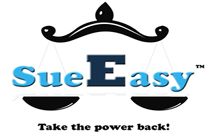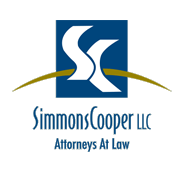 This post originally appeared April 13, 2008. It has been bumped up due to another moronic entrant into the field of trolling for lawsuits. The new site, at the bottom of this post, is WhoCanISue.com. And it, like SueEasy discussed here, raises substantial ethical and litigation issues:
This post originally appeared April 13, 2008. It has been bumped up due to another moronic entrant into the field of trolling for lawsuits. The new site, at the bottom of this post, is WhoCanISue.com. And it, like SueEasy discussed here, raises substantial ethical and litigation issues:
—————————————————————-
When I first heard about SueEasy, I thought it was an April Fool’s joke. But it was October when it first appeared as a development concept (see 10/23/07 post:So How Did You Find Your Attorney? SueEasy!!!). Then I thought it must be a practical joke created by some tort “reformers” to highlight really bad advertising that sometimes takes place. Standard operating procedure is to use anecdotes to tar everyone else to win further protections and immunities for big business.
Sad to say, it has now gone live and appears to be yet another grotesque form of marketing, except that this one is actually dangerous and can help kill legitimate cases. (Note: SueEasy links provided by a TinyUrl redirect, so that this embarrassment to the profession doesn’t benefit from any PageRank by my linking to it.)
According to the site, “SueEasy is neither a law firm, nor is it a lawyer referral service.” That leaves only one thing, a marketing portal of some kind, presumably where lawyers buy space. These types of dumps are a dime a dozen on the web, and I get calls from them all the time. (See: The Ethics of Attorney Search Services.)
But unlike other attorney search services, this one has the potential for some serious damage in a unique way to both client and attorney in personal injury matters.
First, from the client perspective. One question you might expect at a deposition or trial will be this: How did you find your attorney? That doesn’t mean defense counsel can ask what was said, but they might certainly ask how you got to the lawyer you are using. Now can you imagine a jury finding out you used some company called Sue Easy? Perhaps a judge will allow the testimony, perhaps not, but I sure as hell wouldn’t want to be in a position to find out when the answer is SueEasy.
And since you may share documents or write something to this company that advertises it is not a law firm, that stuff you send may not be protected by the attorney-client privilege and may be discoverable (and possibly admissible at trial). Which is to say, that is a way for a defense lawyer to get the SueEasy name in front of a jury.
Here’s something else you might to consider: During jury selection one of the standard issues raised by defense lawyers is that anyone can bring a lawsuit. So if ever there was a way to reinforce that idea, contacting an advertising portal named SueEasy would do it. It’s like handing a big, fat gift to the defendants.
Second, from the attorneys perspective. You have not only shot a stomach churning hole in your own client’s case (and any fee you hope to recover), but you are also at the mercy of the advertising portal to act ethically. As I demonstrated in my other post on the ethics of these portals, this could be a real issue. For example, the site appears to be in violation of New York’s ethical rules because it fails to state that it is attorney advertising.
You might also note the site owners are too embarrassed to identify themselves, so a participating lawyer would be ceding their marketing to an anonymous individual or company. Imagine that, a lawyer putting his or her law license into the hands of anonymous people. Try explaining that one to the disciplinary committee one day.
If you agree to be marketed by that portal, the disciplinary committee of your state may well say that they are your agent, and you are responsible for the content of their site and the conduct of the employees. And they may not look kindly on the willful blindness defense that you will try. (“Really? The site did that? Oh, my, I’m shocked, just shocked to find out. I’ll have a talk with my people and maybe we’ll do something else. Oh, thank you so much for telling me, Madame Chair of the Disciplinary Committee.”)
So my advice to those seeking an attorney:
- Ask around first. Your friends, relatives and neighbors are the best place to start.
- Ask another attorney, even if outside the field you need. While you wouldn’t want a medical malpractice attorney to handle your real estate venture, and vice versa, there’s a pretty good chance that the attorney will at least know where to look for the right person.
- After you get a few names from the above methods, you can check out their websites to see if they give clues as to what field(s) the attorney(s) claim to be proficient in, and interview the attorneys as to other cases in the field that they have handled.
- An attorney search service such as Sue Easy is not just a bad idea, but a spectacularly bad idea, with this possibly be so dangerous as to harm your case or career. Any attorney who uses it for serious personal injury cases may well be committing malpractice.
This company is a bona fide twofer for defendants. They get both the horrible anti-plaintiff’s lawyer press and they get stuff they can actually use in the courtroom. I keep thinking this must be a joke, as no right-minded lawyer would ever affiliate themselves with this outfit. But I fear that is not the case.
See also:
———————————–
August 7, 2008 Update: Another idiotically named marketing business has popped up, called WhoCanISue.com. TortsProf goes in search of the mystery owners (and read the comments). Screen shots of the commercials for this business are here.
Any lawyer that participates in these operations is an embarrassment to the profession.
More on this at:
 Every blogger gets spam. I expect it from the various hustlers who permeate the web. But I didn’t really expect it from a law firm. From a big law firm.
Every blogger gets spam. I expect it from the various hustlers who permeate the web. But I didn’t really expect it from a law firm. From a big law firm.